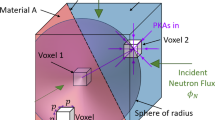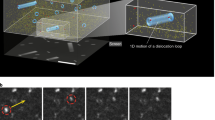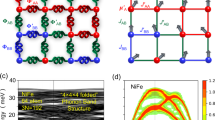Abstract
A VARIETY of observations made in recent years lead to the conclusion that the fate of the fragments generated in crystalline solids by radiative thermal neutron capture is determined, in part, by the density, and possibly the nature, of the defects in the crystals1. It has also been suggested that the annealing reactions which can be carried out after the neutron irradiation by heating or photon irradiation also involve these defects2.
This is a preview of subscription content, access via your institution
Access options
Subscribe to this journal
Receive 51 print issues and online access
$199.00 per year
only $3.90 per issue
Buy this article
- Purchase on Springer Link
- Instant access to full article PDF
Prices may be subject to local taxes which are calculated during checkout
Similar content being viewed by others
References
Maddock, A. G., and Vargas, J. I., Nature, 184, 1931 (1959).
Maddock, A. G., Treloar, F. E., and Vargas, J. I., Trans. Farad. Soc. (in the press).
Pick, H., and Weber, H., Z. Physik., 128, 409 (1950).
Maddock, A. G., and Müller, H., Trans. Farad. Soc., 56, 509 (1960).
Claridge, R. F. C., and Maddock, A. G., Trans. Farad. Soc., 57, 1392 (1961).
Author information
Authors and Affiliations
Rights and permissions
About this article
Cite this article
ANDERSEN, T., MADDOCK, A. Evidence of the Influence of Defects on the Szilard–Chalmers Process. Nature 194, 371–372 (1962). https://doi.org/10.1038/194371b0
Issue Date:
DOI: https://doi.org/10.1038/194371b0
This article is cited by
Comments
By submitting a comment you agree to abide by our Terms and Community Guidelines. If you find something abusive or that does not comply with our terms or guidelines please flag it as inappropriate.



